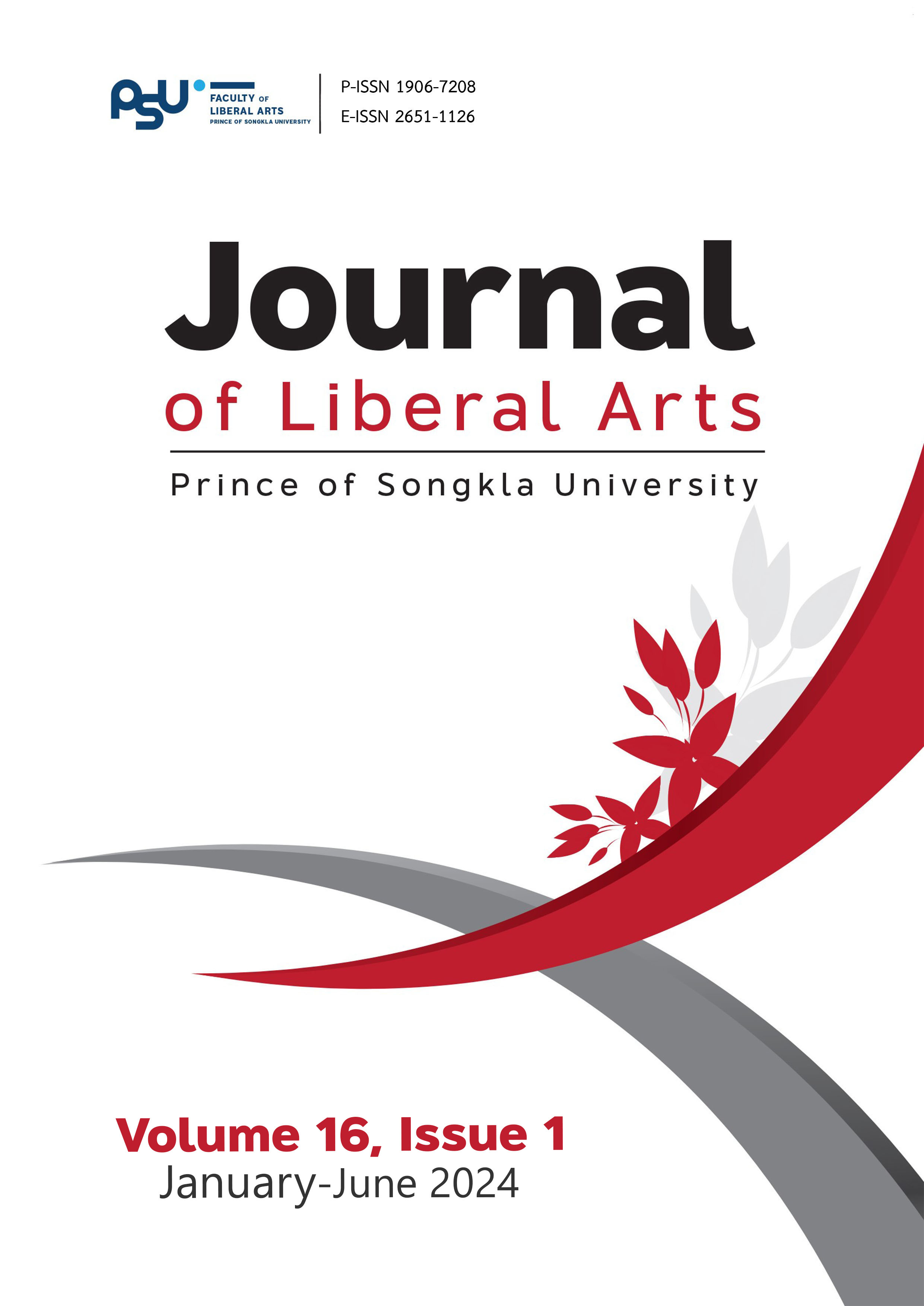A Study of Chinese Idiom Expressions Containing the Word jin (Gold)
DOI:
https://doi.org/10.14456/jlapsu.2024.2Keywords:
“jin”, gold, Chinese, idioms, metaphorAbstract
Idioms are phrases or sayings metaphorically composed with a subtle hidden meaning that cannot be deciphered by direct literal translation of individual words. Long-standing idiomatic expressions that have been passed down through ages in each language are precious cultural heritage for people using that language, as they can reflect, for instance, thoughts and beliefs of people from earlier generations within the society. Chinese people often use idiomatic expressions in their daily communication. Many idioms are derived from natural environment, and are in line with ancient Chinese beliefs in the five elements of earth, water, fire, wood and metal, considered the basic components of everything in the world. Due to the fact that gold is a representation of preciousness often related to certain beliefs or concepts in Chinese culture, this article therefore aims to study and analyse idioms containing the word “jin” (金gold) in order to understand their metaphorical meanings, as well as beliefs, values and other aspects related to them. It was shown that there were 411 idioms containing “jin” (gold) collected from eight selected Chinese idioms dictionaries, with a total of 414 metaphorical meanings.
These metaphorical meanings can be further divided into nine groups: human, preciousness, beauty, money and treasured items, social status and standard, goodness, stability and strength, nature, and other meanings. Chinese idioms containing the word “jin” (gold) can help us gain insights into the past Chinese society, as well as the values, culture, traditions, and beliefs of the Chinese people.
References
Chen, J. (1986). Yin Yang Wuxing Babu Qiyuan Xinshuo (in Chinese) [A new theory of the origin of the five elements of Yin yang]. Studies in the History of Natural Sciences, 5(2),97-112. https://kns.cnki.net/kcms2/article/abstract?v=3uoqIhG8C44YLTlOAiTRKqd0WnNPv0wTDjtDUwHroNxgjGwOdF8RaTDfBuBEXguNGI4b_N0ATFVprCi_mMBcR5JLdSbdgq2v&uniplatform=NZKPT
Dictionary Editing Office Institute of Linguistics Chinese Academy of Sciences. (1996). Xiandai Hanyu Cidian (3th ed) (in Chinese) [Modern Chinese dictionary]. The Commercial Press.
Fang, H. (2013). Qingdai Manzu de Jing Ya Wenhua (in Chinese) [The crow culture of the Manchus in the Qing Dynasty]. Gansu Ethnic Studies, 2013(2), 86-90.
Lakoff, G., & Johnson, M. (1980). Metaphors we live by. Chicago University Press.
Language Research Institute of Hubei University. (2004). Hanyu Chengyu Da Cidian (in Chinese) [Chinese idioms dictionary]. Zhonghua Book Company.
Lexicographical Center of Commercial Press. (2015). Xinhua Chengyu Cidian (in Chinese) [Xinhua idioms dictionary]. The Commercial Press.
Li, X. (2006). Xiandai Hanyu Chengyu Guifan Da Cidian (in Chinese) [Modern Chinese standard idioms dictionary]. Changchun Publishing House
Liu, J. (2012). Hanyu Chengyu Jinghua Cidian (Baipi) (in Chinese) [Chinese idioms essence dictionary (white)]. Kaiming Publishing House.
Luo, Z. (1986). Hanyu Da Cidian (in Chinese) [Grand Chinese dictionary]. Hanyu Dacidian Chubanshe.
Song, Y. (2017). Hanyu Chengyu Cidian (in Chinese) [Chinese idioms dictionary]. Sichuan Lexicographical Press.
Wang, J. & Chen, Y. (2015). Jiyu Yuliaoku de Zhongguo Chuantong Zhexue Shuyu “Wuxing” Yinyu Fanyi yu Duiwai Hanyu Jiaoxue Yanjiu (in Chinese) [Translation of the metaphor of the traditional Chinese philosophical term "Five Elements" based on corpus and research on teaching Chinese as a foreign language]. Journal of Dalian University 36(6), 139-143. https://kns.cnki.net/kcms2/article/abstract?v=3uoqIhG8C44YLTlOAiTRKibYlV5Vjs7ijP0rjQDAVm8oHBO0FTadrZLl_Ipm5LyqMe6FnaHagErledaPQvjS86sEm8ZZmpB&uniplatform=NZKPT.
Wang, S., & Sun, Y. (2010). “Jin” Ciqun zhong Chengyu de Yinyu Renzhi Fenxi. (in Chinese) [Metaphorical cognitive analysis of idioms in the "gold" word group]. Journal of Anhui Literature, 2010(12), 242-243. https://kns.cnki.net/kcms2/article/abstract?v=3uoqIhG8C44YLTlOAiTRKgchrJ08w1e7_IFawAif0my9J275rTFshgZNvF_XnQiYD_DR5yRTamKojo7aMWe5AY6w90IOM9Q&uniplatform=NZKPT
Wang, X. (2017). Hanyu Chengyu Da Cidian (in Chinese) [Chinese idioms dictionary]. Sinolingua Press.
Wei, Y. (2018). A study on the Metaphor of “Gold” in Chinese idioms. Southwest University. https://kns.cnki.net/kcms2/article/abstract?v=2KdPcD7ewrS11XtuYOYWgZGu_ukI88lfERdH2b0LfJYM_DxDV5xC2klB_STNfVwSBSBSPaqzXynVlD5oSTtt6myJ73SiOM7zvghmKKWXDVbN2FiGLDxdg==&uniplatform=NZKPT&language=gb
Xu, G. (2009). Yin Yang Wuxing Zhexue Guannian dui Zhongguo Chuantong Yinshi Wenhua de Yingxiang (in Chinese) [The influence of the philosophical concept of yin and yang and the five elements on traditional Chinese food culture]. New West Journal, 2009 (09), 135-136. https://kns.cnki.net/kcms2/article/abstract?v=3uoqIhG8C44YLTlOAiTRKgchrJ08w1e75TZJapvoLK2mqDPZWAthiDRhFYDG3hN3In5heJ9iIXikh
Bb544W7yHfyzcJK_P&uniplatform=NZKPT
Xu, H. (2011). Jinzi Wenhua dui Zhongguo Kuaiji Wenhua Jianshe de Gongxian (in Chinese) [The contribution of the “gold” character culture to the construction of China's accounting culture]. Journal of Inner Mongolia University of Electricity, 2011(125), 14-15. https://doi.org/10.16162/j.issn.1672-3473.2011.01.038
Yi, M. (2010). Gudai Yueqihua Bayin (in Chinese) [Eight tones of ancient musical instru-ments]. Guoxue, 2010(4), 78-80. https://kns.cnki.net/kcms2/article/abstract?v=3uoqIhG8C44YLTlOAiTRKgchrJ08w1e7_IFawAif0myv4JBlAN9nd2r0igGYEDXMGQ1I6LBx-gO0IFC2wOV1uqK7crxILuND&uniplatform=NZKPT.
Yuan, K. (1998). Zhongguo Shenhua Chuanshuo (in Chinese) [Chinese myths and legends].214 People's Literature Publishing House
Zhang, L. (2010). Wuxing guan dui Zhongguo gudai renxue sixiang de yingxiang (in Chinese) [The influence of the Five Elements on ancient Chinese anthropological thought]. Journal of Liaoning University (Philosophy and Social Science), 38(2), 1-7. https://kns.cnki.net/kcms2/article/abstract?v=3uoqIhG8C44YLTlOAiTRKgchrJ08w1e7_IFawAif0mxyjUStHz4nG-l2RjDhjdM5FFeBxkpmiIzE7paIzWv9Z8AmvDZbHv1K&uniplatform=NZKPT
Zhang, Y., & Ma, Q. (2018). Wuxing Wenhua dui Yishu Sheji de Yingxiang Chutan (in Chinese) [A preliminary study on the influence of the Five Elements culture on art design].
Space Art Journal, 2018(1), 50-53. https://doi.org/10.13337/j.cnki.packaging.world.2018.01.008
Zhao, J., Zhang, Y., & Tan, L. (2013). Zhonghua Chengyu Da Cidian (in Chinese) [Zhonghua idioms dictionary]. Sinolingua Press.
Downloads
Published
How to Cite
Issue
Section
License
Copyright (c) 2024 Pimpan Jantondaeng, Zheng Zezhi

This work is licensed under a Creative Commons Attribution-NonCommercial-NoDerivatives 4.0 International License.
The authors retain the copyright to their article but the Journal of Liberal Arts, Prince of Songkla University reserves the exclusive rights to first publication.






